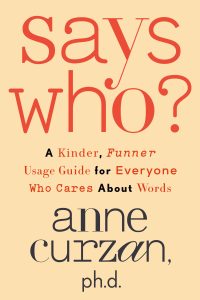Sometimes I reserve books from my public library and by the time they become available, I have completely forgotten why I was interested. One such book was Anne Curzan’s “Says Who? A Kinder, Funner Usage Guide for Everyone Who Cares About Words.” It fell to the bottom of my library bag and I almost returned it unopened. Fortunately, I decided to skim the introduction and held onto it, and I’m so glad I did.
Curzan’s new book discusses the various linguistic pet peeves she is regularly questioned about as an English professor, radio show host, and member of the Usage Panel for the American Heritage Dictionary. (Did you know this was a thing? It’s quite the who’s who of the “Masters of the English Language.” Go check out the list – I’ll wait!)
Each chapter dives into a common complaint or point of confusion about the use of a word, part of speech, or punctuation, and how the grammar rules most of us learned in school came to be (spoiler alert – it was usually just one guy’s opinion). Curzan also talks about the evolution of common word usage, and the acceptance of those changes into standard usage over time.
Some of my favorite examples Curzan presents include:
- Mark Twain using the adverb “literally” in a way that would make most English teachers want to literally throw their copies of The Adventures of Tom Sawyer at the wall (and Louisa May Alcott does it as well!) (p. 69);
- The incongruity behind why few people notice when the * symbol is pronounced “asteriks” (instead of “asterisk”) but many are agitated when they hear “aks” in place of “ask“. In fact, William Chaucer used both “ask” and “axe” interchangeably in his writing – neither are incorrect, just examples of dialectal differences (p. 92).
- “They” has functioned as a singular gender-neutral pronoun for at least 8 centuries – Shakespeare used it, as did Jane Austen (p. 144).
Through the book, Curzan challenges the reader to step back from their inner “grammando” (a long-overdue replacement for “grammar Nazi”) and embrace their inner “wordie”- to be curious, not judgy, and find joy in the ever-changing English language and its many dialects and variations.
Curzan, Anne. (2024). Says Who? Crown.


